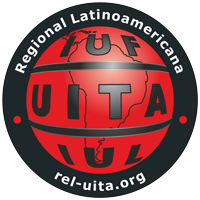Honoring Belela Herrera
The Human Rights Journalism Prize is awarded by Brazil’s Movement for Justice and Human Rights (MJDH), in partnership with the Rio Grande do Sul chapter of the Ordem dos Advogados do Brasil (the country’s bar association) and the support of a number of organizations, including Rel UITA (IUF Latin America). This year’s recipient was announced last Wednesday, February 15, with the 39th edition of the prize going to the Uruguayan national Belela Herrera, a great champion of human rights, recognized throughout the continent.
Amalia Antúnez
24 | 02 | 2023

Belela Herrera | Photo: Daniel García
María Bernabela Herrera, known by everyone as Belela, welcomed us into her home in Montevideo, where we presented her with this award in recognition of her decades-long human rights defense work.
Always gracious, her characteristic warmth heightened by her more than 90 years of age, Belela was visible moved as she received the award and expressed her gratitude.
She first began working in the field of human rights in 1973, when she was living in Chile.
Some years ago, when the Uruguayan Postal Service issued a stamp commemorating her life and work, her friend and fellow champion of human rights causes, MJDH president Jair Krischke recalled: “When Salvador Allende was overthrown and the Chilean dictatorship turned vicious, Belela, who was living in Santiago at the time because her husband was the Uruguayan ambassador to Chile, took it upon herself to start rescuing political exiles of various nationalities by stashing them in her small car and taking them to different embassies to save their lives.”
That was just one of Belela’s many actions in Chile. That same year, and until early 1980, she started heading the efforts of the Office of the United Nations High Commissioner for Refugees (UNHCR) in the region, helping to save thousands of lives.
She was later appointed to the position of deputy representative of the UNHCR’s Regional Office for Central America, the Caribbean and Mexico, based in Costa Rica.
In late 1982, Belela took over as deputy regional representative of the UN agency’s Office for Southern Latin America, headquartered in Argentina.
She also worked in Mexico, Spain—where she was participated in the opening of that country’s office—, Peru, and Brazil.
From 1987 to 1989, she was a member of the National Pro Referendum Commission in her home country, Uruguay, which was formed to further efforts to repeal an amnesty law (known as the “Expiry of the Punitive Powers of the State Act”), that prevented the prosecution of crimes committed during the 1973-1985 dictatorship.
From 1995 to 2001, she was Director of International Relations and Cooperation of the Municipal Government of Montevideo, and from 2005 to 2008 she was Uruguay’s Undersecretary of Foreign Affairs.
This brief overview of her life as a human rights defender gives us a glimpse of her intense and hugely significant work, but Belela is much more than that: she is living history of an era.
Her small frame gives the appearance of fragility; but she is anything but fragile. Countless examples throughout her life as a human rights advocate reveal an enormous inner strength and courage that make her an admirable woman.
The memories keep coming as our conversation progresses. Belela’s main concern now is the need to convey to the younger generations the events of the recent past, in particular what happened during the dictatorships of the Southern Cone.
“We lived through it, we know what happened, the atrocities that were committed, the abuses, the torture and the disappearance of thousands of individuals; but young people need to learn about that history, to ensure that it will never be repeated,” she says.
I feel immensely privileged to be the one who presents her with this award and as we talk about the various human rights issues that persist in our region and she tells me how she still works with human rights bodies to address them, I am reminded of Bertolt Brecht’s famous quote about indispensable men, but slightly adapted to include this remarkable woman: “There are persons who struggle for one day and they are good; there are others who struggle for a year and they are better. There are persons who struggle for many years and they are better still. But there are those who struggle all their lives: These are the indispensable ones.”
Belela is one of those indispensable persons and this tribute to her life devoted to the defense and struggle for human rights is not just justified, it is an act of justice.

Photo: Daniel García
